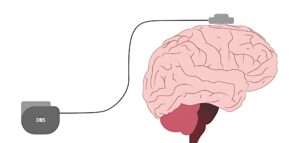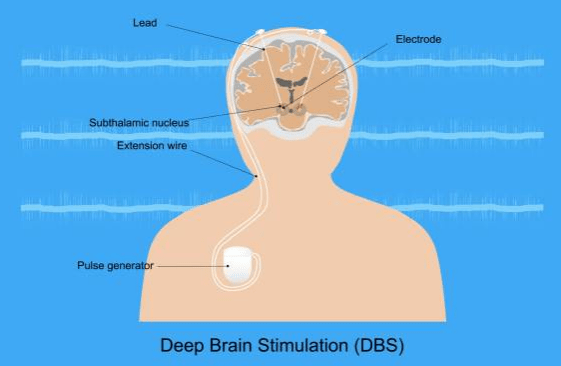
160,000 (approx.) patients worldwide had undergone DBS for Parkinson’s disease by 2020

160,000 (approx.) patients worldwide had undergone DBS for Parkinson’s disease by 2020

40,000 individuals worldwide had received DBS for essential tremor by 2020

75% success rate

1,50,000 people globally have benefitted from DBS Therapy

160,000 (approx.) patients worldwide had undergone DBS for Parkinson’s disease by 2020

40,000 individuals worldwide had received DBS for essential tremor by 2020

75% success rate

1,50,000 people globally have benefitted from DBS Therapy
 If you or a loved one is seeking effective relief from neurological disorders, exploring DBS surgery in Hyderabad from a competent neurosurgeon like Dr Raveesh Sunkara could be a promising avenue for improved well-being.
If you or a loved one is seeking effective relief from neurological disorders, exploring DBS surgery in Hyderabad from a competent neurosurgeon like Dr Raveesh Sunkara could be a promising avenue for improved well-being.
Deep Brain Stimulation (DBS) is a surgical procedure that involves the implantation of electrodes into specific areas of the brain to regulate abnormal brain activity. It is commonly performed to manage neurological conditions such as Parkinson’s disease, essential tremor, epilepsy, cluster headache, and dystonia when medications alone are no longer effective. DBS aims to alleviate symptoms and improve the quality of life for individuals facing these challenges.
Dr Raveesh Sunkara, a highly qualified and skilled neurosurgeon in Hyderabad, is committed to providing cutting-edge neurosurgical care, including deep brain stimulation for Parkinson’s disease and other neurological conditions, with the utmost care and expertise. Renowned for his immense proficiency in neurosurgery in Hyderabad, Dr Sunkara has helped many patients regain their quality of life through brain stimulation therapy.
For detailed information about DBS surgery in Hyderabad, its procedure, cost, benefits, eligibility, side effects and post-procedure care, continue reading.
Unleash your mind's potential: Embrace the future with Deep Brain Stimulation.
Unleash your mind's potential: Embrace the future with Deep Brain Stimulation.
 The Deep Brain Stimulation procedure involves the following key steps:
The Deep Brain Stimulation procedure involves the following key steps:
The patient is placed under general anesthesia to ensure comfort and painlessness during the surgery.
The neurosurgeon makes a small opening in the skull to access the brain. Then, the surgeon precisely implants thin, insulated electrodes into specific brain regions. These regions are identified using advanced imaging techniques and neurophysiological mapping.
The electrodes are connected via extension wires to a pulse generator (stimulator) implanted beneath the skin, typically near the collarbone. The stimulator delivers controlled electrical impulses to the brain.
Once the electrodes and stimulator are in place, the patient undergoes a programming session. Surgeons adjust the stimulation settings to find the optimal parameters that alleviate symptoms while minimizing side effects. This process may require multiple sessions over a few weeks.
The DBS procedure combines surgical precision with advanced technology to provide relief to individuals suffering from neurological disorders. Consult a skilled neurosurgeon to determine if DBS surgery is the right option for you or your loved one.
The Deep Brain Stimulation cost in Hyderabad can vary depending on several factors, including the hospital or medical facility chosen, the neurosurgeon’s expertise, the complexity of the procedure, the type of medical equipment used, and the patient’s specific needs.
Providing an exact cost here may not be accurate, as medical expenses are subject to change over time. To get a precise estimate of the deep brain stimulation cost in Hyderabad, consult Dr Raveesh Sunkara’s team or the medical facility directly. They can provide you with a detailed breakdown of the expenses involved and any potential financing options that may be available.
When considering the deep brain stimulation surgery cost, weighing the potential benefits and improvements in the quality of life that the procedure can offer for individuals struggling with neurological conditions is essential.
The benefits of DBS surgery include:
DBS surgery is considered for individuals who have not responded adequately to conventional treatments or medications. Eligibility criteria may include factors such as overall health, age, and the severity of symptoms.
Suitability for DBS surgery is determined through a comprehensive evaluation by an expert neurosurgeon like Dr Raveesh Sunkara.
Generally, suitable candidates are those who:
Side effects of DBS surgery may include:
“Not all patients will experience these side effects, and their likelihood varies based on individual factors and the specific case. Discuss potential risks and benefits with your healthcare provider before making a decision,” advises Dr Raveesh Sunkara, a proficient neurosurgeon in Hyderabad.
After Deep Brain Stimulation (DBS) surgery, post-procedure care is essential for a successful recovery:
Overall, close collaboration with the medical team and following their guidance is crucial during the post-procedure care and recovery phase to ensure the best possible outcomes.
Unlock new possibilities with advanced brain surgery
Unlock new possibilities with advanced brain surgery

Dr Raveesh Sunkara is a well-known neurosurgeon in Hyderabad, specialising in brain stimulation surgery. His extensive knowledge in neurosurgery ensures that patients receive the highest quality care and positive outcomes.



Dr Sunkara provides personalized and comprehensive care to each patient. He takes the time to understand individual needs, tailoring treatment plans to optimize outcomes and improve patients’ quality of life.



With a focus on utilizing the latest technological advancements in neurosurgery, Dr Sunkara ensures that his patients benefit from the most advanced and effective treatment options.



Dr Sunkara prioritizes patient well-being and comfort. He fosters open communication, involving patients in decision-making and addressing any concerns or questions they may have throughout the treatment.



Dr Raveesh Sunkara is a well-known neurosurgeon in Hyderabad, specialising in brain stimulation surgery. His extensive knowledge in neurosurgery ensures that patients receive the highest quality care and positive outcomes.



Dr Sunkara provides personalized and comprehensive care to each patient. He takes the time to understand individual needs, tailoring treatment plans to optimize outcomes and improve patients’ quality of life.



With a focus on utilizing the latest technological advancements in neurosurgery, Dr Sunkara ensures that his patients benefit from the most advanced and effective treatment options.



Dr Sunkara prioritizes patient well-being and comfort. He fosters open communication, involving patients in decision-making and addressing any concerns or questions they may have throughout the treatment.
With the right treatment approach, timely intervention, and effective rehabilitation, individuals can regain their functionality and improve their quality of life after experiencing a brain stroke.
Individuals seeking brain stroke treatment in Hyderabad can rely on Dr Raveesh Sunkara, a trusted neurosurgeon with extensive expertise in treating brain strokes.
With his knowledge and dedication, patients can trust Dr Raveesh Sunkara to deliver high-quality care and guidance throughout their brain stroke treatment journey.
The extent of recovery following a brain stroke varies for each individual and depends on factors such as the severity of the stroke and the effectiveness of treatment.
With prompt medical intervention, rehabilitation, and lifestyle modifications, many individuals can experience significant recovery and regain lost functions.
Rehabilitation after a brain stroke focuses on helping patients regain lost abilities and improve their quality of life. It may involve physical therapy to improve mobility and strength, speech therapy to address communication difficulties, occupational therapy to assist with daily activities, and psychological support to cope with emotional challenges.
The recovery process after a brain stroke is unique to each individual. Achieving significant improvements can take weeks, months, or even years.
The recovery duration depends on various factors, including the stroke’s severity, the patient’s overall health, and their adherence to rehabilitation programs.
While preventing a brain stroke is not always possible, certain lifestyle modifications can help reduce the risk. These include maintaining a healthy blood pressure, managing diabetes, quitting smoking, staying physically active, following a nutritious diet, and controlling cholesterol levels. Regular check-ups and medical consultations are also essential.
To recognize the signs of a stroke quickly, remember the acronym “FAST”: